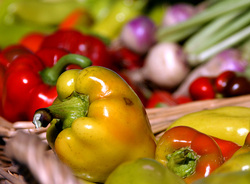Food Travels
by J

Have you ever wondered what your food has gone through to reach your plate? Have you ever wondered where your food has come from? Do you know where your food began its journey? Many people don’t realize the secrets of what the food industry is doing to us and how they are putting such an impact on our everyday lives. Food changes our lives because it gives us energy we need to live.
A lot of our fruits and vegetables come from factories, where they are processed far away. This is concerning because food is not being treated how we deserve for it to be treated. It is unhealthy for us and our environment.
On average, food is traveling halfway across the world just to reach our local grocery store. Industrial food is bad for you and our environment in many ways. Our food travels on trains, trucks, and boats to reach our grocery stores. Every day, each household consumes about 1000 kilowatt hours of energy from food travel. We consume way too many fossil fuels, and that is playing an enormous part in global warming. The average amount of miles and energy it takes our food to get to us is enough to drive across the United States almost three times.
Also, food, specifically our fruits and vegetables, are not only being processed and getting germs plus bacteria from their transportation, but they are also getting chemicals pumped into them to make them look more appealing, juicy, and ripe. That’s why you can always see the four seasons in the grocery store. Our food is traveling from many different climates around the US and the world. All industrial food goes through that process, except if you buy organic. Without organic food that travels, we would never have fresh fruits and veggies, especially in the winter at our grocery store or local farmer's market. Produce that is grown outside freezes all around the US, and local fruit is scarce in North Carolina during winter. We do not have many options but to buy the food that has many different chemicals on them. This is one of the reasons farmers are adding chemicals that are not necessary into our food.
Another kind of food some of us buy is called industrial organic. Stonyfield yogurt is industrial organic. Industrial organic is organic food coming from huge companies. Stonyfield has 100% organic products. This industrial company is organic and “healthy,” but their products come from too far away to be frozen in our grocery store. It is hardly organic anymore from all of the emissions and chemicals it has gotten from traveling.
Fruits and vegetables are not the only thing we eat that is treated unfairly. Almost all of our food travels through a process of being picked by machines, having loads of chemicals put into them, traveling, and then ending their cycle at our grocery store. Food companies have no right to treat us like this, and we know it. Our food industries and the way we eat has changed more in the last fifty years than in the past ten thousand. If every one of us is motivated to make a difference in our buying and eating habits, then we can. As individuals, we have to stand up for ourselves and our communities.
From the real farms.
To the unreal factories.
